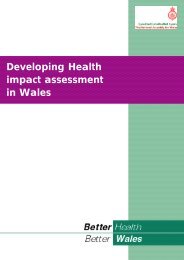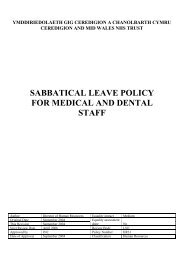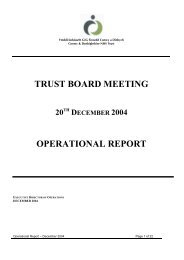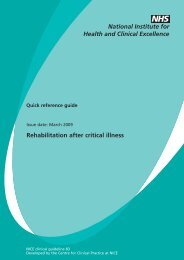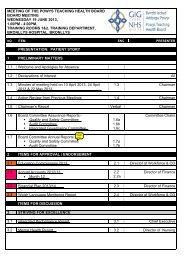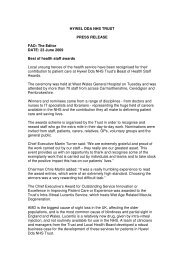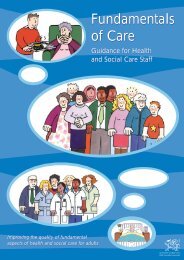Betsi Cadwaladr University Local Health Board ... - Health in Wales
Betsi Cadwaladr University Local Health Board ... - Health in Wales
Betsi Cadwaladr University Local Health Board ... - Health in Wales
Create successful ePaper yourself
Turn your PDF publications into a flip-book with our unique Google optimized e-Paper software.
treatments or services that have not been approved by national guidance<br />
such as NICE, The Cochrane Centre or Public <strong>Health</strong> <strong>Wales</strong> or the All <strong>Wales</strong><br />
Medic<strong>in</strong>es Strategy Group, <strong>in</strong> order for fund<strong>in</strong>g to be agreed then there must<br />
exist an unusual cl<strong>in</strong>ical factor about the patient that suggests that they are<br />
Significantly different to the general population suffer<strong>in</strong>g from their cl<strong>in</strong>ical<br />
condition<br />
Likely to ga<strong>in</strong> significantly more benefit from the treatment or service than<br />
the general patient population with the cl<strong>in</strong>ical condition<br />
The request<strong>in</strong>g cl<strong>in</strong>ician should highlight any case of exceptionality to the<br />
LHB when mak<strong>in</strong>g the fund<strong>in</strong>g application.<br />
The follow<strong>in</strong>g def<strong>in</strong>ition has been recommended for use <strong>in</strong> <strong>Wales</strong> 1 :<br />
Central to consideration of <strong>in</strong>dividual cases is the concept of the case be<strong>in</strong>g<br />
exceptional. The def<strong>in</strong>ition of exception is 'an <strong>in</strong>stance that does not follow a rule'.<br />
There cannot therefore be 'rules' to guide decisions on exceptions; rather such rules<br />
would constitute criteria (policy) to provide the service.<br />
1. In order for fund<strong>in</strong>g to be agreed there must be some unusual* cl<strong>in</strong>ical factor<br />
about the patient that suggests that they are<br />
i. Significantly different to the general population of patients with the<br />
condition <strong>in</strong> question<br />
ii. Likely to ga<strong>in</strong> significantly more benefit from the <strong>in</strong>tervention than<br />
might be expected from the average patient with the condition<br />
2. The fact that a treatment is likely to be efficacious for a patient is not, <strong>in</strong> itself,<br />
a basis for an exemption.<br />
3. If a patient's cl<strong>in</strong>ical condition matches the 'accepted <strong>in</strong>dications' for a<br />
treatment that is not funded, their circumstances are not, by def<strong>in</strong>ition,<br />
exceptional.<br />
4. It is for the request<strong>in</strong>g cl<strong>in</strong>ician (or patient) to make the case for exceptional<br />
status.<br />
5. Social value judgments are rarely relevant to the consideration of exceptional<br />
status<br />
* The <strong>in</strong>itial term<strong>in</strong>ology was ‘unusual or unique’ but it is better to clearly differentiate<br />
unique from exceptional.<br />
1 Adapted from UK Specialized Services Public <strong>Health</strong> Network<br />
8<br />
Comment [R1]: ? add<br />
def<strong>in</strong>ition here




